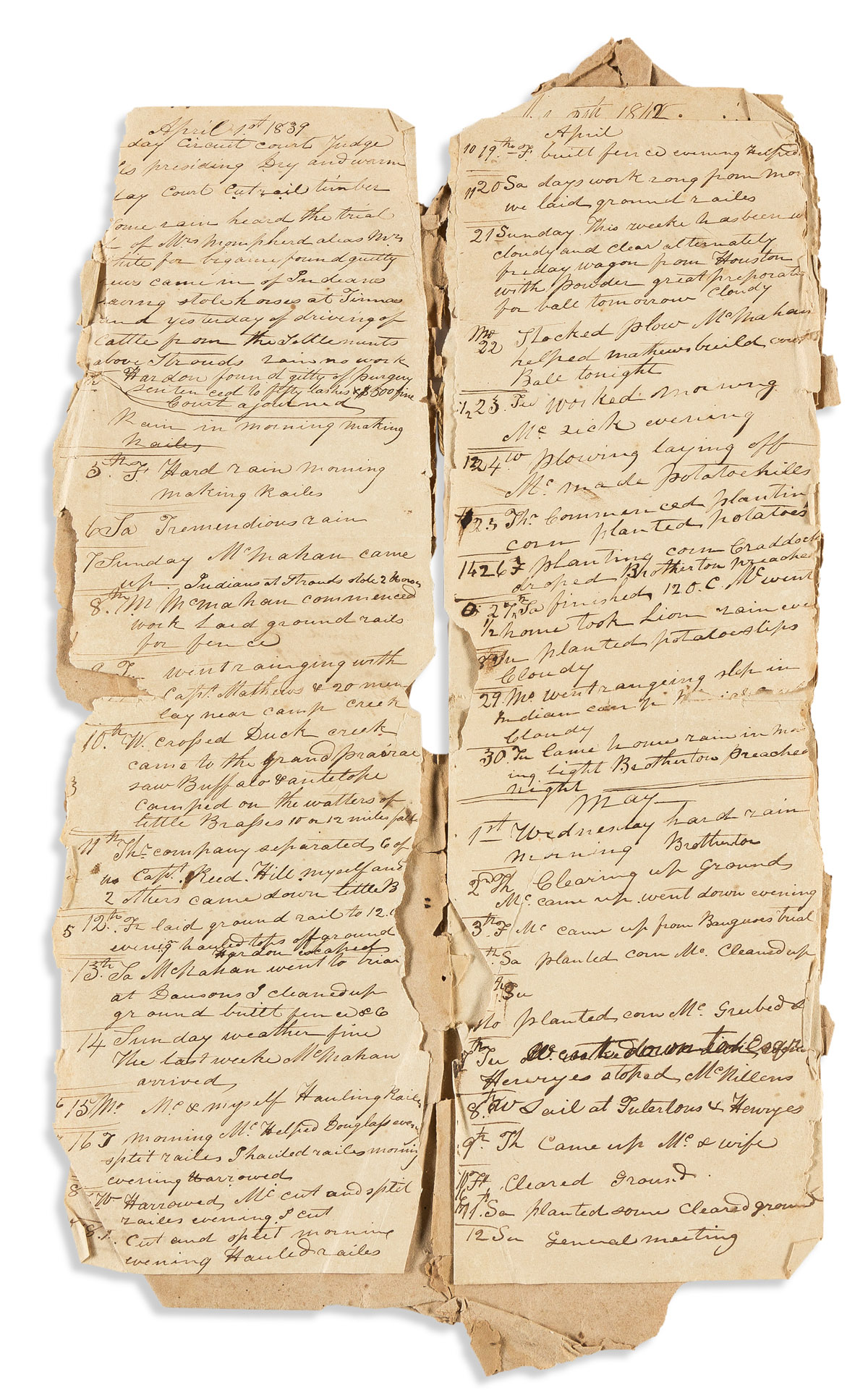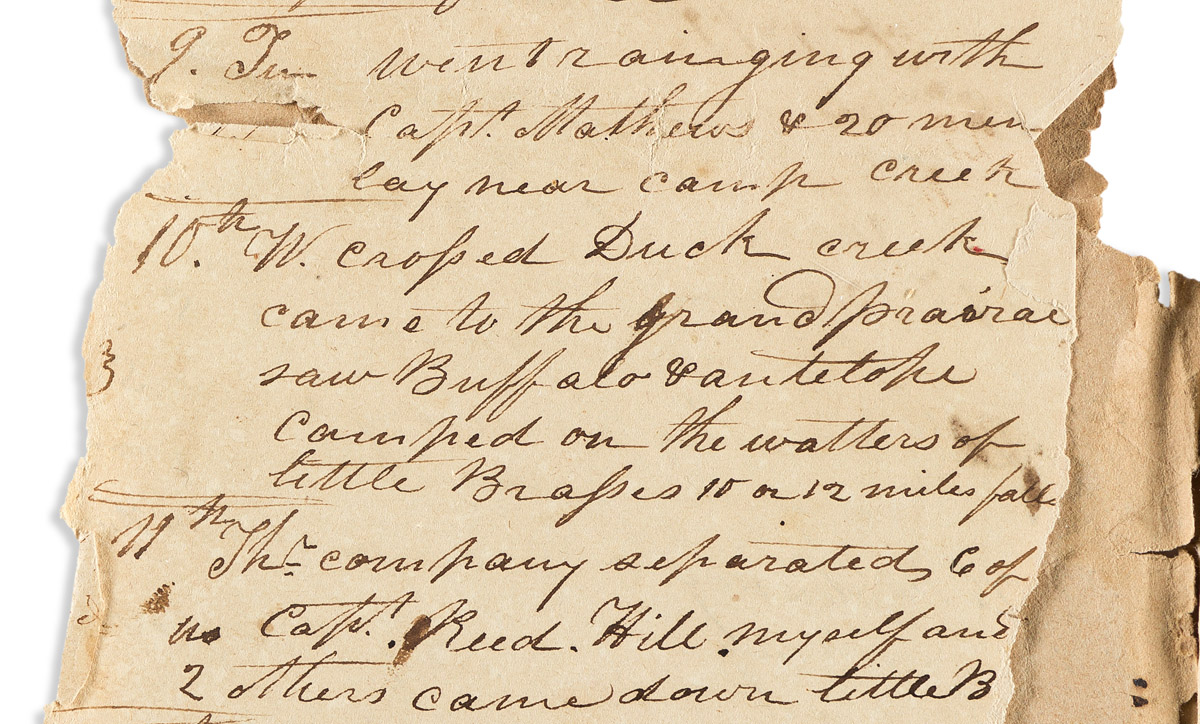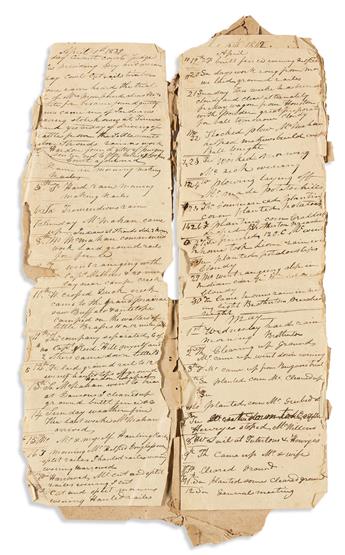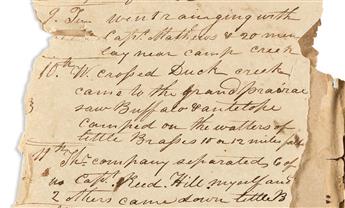Sale 2600 - Lot 283
Price Realized: $ 8,000
Price Realized: $ 10,000
?Final Price Realized includes Buyer’s Premium added to Hammer Price
Estimate: $ 2,500 - $ 3,500
(WEST--TEXAS.) Diary of Texas Ranger Edwin L. Patton during the early Republic, and related family papers. 58 items in one box; earlier material generally worn with separations at folds. Various places, 1826-1862
Additional Details
Edwin Le Roy Patton (1803-1880) was born in South Carolina, lived briefly in Indiana as a young man, and settled in Robertson County in east-central Texas by 1839. There he became a prominent landholder and was named the county's Chief Justice in 1843. Though well past the usual fighting age, he volunteered for the Confederacy in the Civil War.
At the heart of this lot is a humble diary kept by Patton from 5 March to 16 May 1839, with 3 additional entries written in 1842. It extends over just 5 pages on a long narrow notebook (12 1/4 x 4 inches) with worn paper wrappers; the two main diary leaves are detached and worn at the edges with moderate loss of text. Most of the entries make brief note of the grueling labor of frontier agriculture: splitting rails, planting corn and potatoes. Patton was also on the muster rolls as a private in the Texas Rangers during this period, and this diary describes three occasions when he was summoned for "rainging" expeditions. On 16 March, he wrote "Received orders from Capt. [James D.] Mathews [to] range tomorrow week." This expedition was described briefly on 24 March: "Went rainging with Majr. Weppler, camped on small creek after visiting Grand Praire Creek, Parkers Creek." The next day he returned home. The next mission started on 9 April: "Went rainging with Capt. Mathews & 20 men, lay near Camp Creek." The next day, "crossed Duck Creek, came to the Grand Prairae, saw buffalo & antelope, camped on the watters of Little Brasses" [Brazos]. He returned home on the third day: "The company separated, 6 of us, Capt. Reed, Hill, myself and 2 others came down Little B." Finally he noted on 29 April: "Went rainging, slep in Indian camp," and returned home the next day.
When not "rainging," Patton was busy ranching, farming, and participating in civic life. His longest and perhaps most dramatic entry was on 1 April: "Circuit court . . . Heard the trial of Mrs. Mompherd alias Mrs, White for bigamy, found guilty. News came in of Indians having stole horses at Timas and yesterday of driving of cattle from the settlement above Strouds. . . . Hardon found guilty of purgery, sentenced to fifty lashes & $500 fine." He discussed nearby Stroud's Station a couple of other times: "Went Strouds with Judge Slaughter & Sqr. Owen, returned in the evening, driveing 9 cow for slaughter & beef" (30 March); "Indians at Strouds stole 2 horses" (7 April). Among the handful of later entries, 28 July 1842 stands out: "Indians stole horses Sunday night last." Early Texas diaries are rarely seen. We can trace no other manuscript civilian diaries from the Republic of Texas at auction since 2007.
The diary is accompanied by related papers of Edwin L. Patton and his family: 29 letters dated 1826 to 1862, and 28 accounts and legal documents dated 1835 to 1853. Brother William Patton of Sims Creek, AL, wrote on 13 October with extensive commentary on the presidential election, including rumors that "the abolitionists will yet put up a candidate of their own as Clay refuses to harmonize with them." Another brother, George Ross Patton, wrote from Green County, AL on 20 May 1844 with a detailed list of the family's recent slave purchases, adding: "We feel considerable anxiety on the subject of the anexation of Texas to the Union and hope the friends of the polacy will act firm and fearless regardless of our political opponants both of England and America on the subject of slavery." An old friend named McElwain from Pike County, Indiana discussed politics on 28 June 1858: "Two years ago about Kansas, Duglas started the fus to win over the South for president but he can't comit. . . . As to slavery, I'm willing to wait God time, as I think all things will move agreable to his order." As war approached, son W.W. Patton wrote from Cotton Gin, TX on 2 December 1860: "We have had a great deel of political excitement . . . we have organized a company at Cotton Gin and are trying to organize another. Cotton Gin is a fast place." A few items relate to Edwin Patton's nephew Thomas Monroe Patton (1822-1888), also of Robertson County, including a Texas state land grant issued to and signed by Governor George T. Wood, quite worn, Austin, TX, 3 October 1849; and a letter from cousin Thomas L.C. Means of Sims Creek, SC ("there has been a great deal of sickness about Clinton and some deaths but principally among the Negroes"), 28 February 1846.
Son Thomas McCutcheon Patton wrote 3 times while on duty in the Confederate Army, twice from Camp Wright on Red River County, TX in August 1862, and once from Camp Camden in Arkansas, 13 September 1862. On 13 August he wrote "We heard an Indian preach. He preached in ower tung. He said it was his first time. I do not like the looks of the Indians." On 13 September he wrote that "L.W. Kidwell shot himself through the hand," complained that "Arkansis is verry poor country," and noted that his horse "came very near dying" on the march. Private Patton died two months later on 22 November.
WITH--a small group of family papers of William Gaston Parsons (1837-1873) of Weatherford, TX, who married Edwin Patton's daughter Mary Louisa and served as a chaplain in the Confederate army. 27 items, including copies of his army commission and discharge, and 2 Confederate tax receipts, 1856-1915.
At the heart of this lot is a humble diary kept by Patton from 5 March to 16 May 1839, with 3 additional entries written in 1842. It extends over just 5 pages on a long narrow notebook (12 1/4 x 4 inches) with worn paper wrappers; the two main diary leaves are detached and worn at the edges with moderate loss of text. Most of the entries make brief note of the grueling labor of frontier agriculture: splitting rails, planting corn and potatoes. Patton was also on the muster rolls as a private in the Texas Rangers during this period, and this diary describes three occasions when he was summoned for "rainging" expeditions. On 16 March, he wrote "Received orders from Capt. [James D.] Mathews [to] range tomorrow week." This expedition was described briefly on 24 March: "Went rainging with Majr. Weppler, camped on small creek after visiting Grand Praire Creek, Parkers Creek." The next day he returned home. The next mission started on 9 April: "Went rainging with Capt. Mathews & 20 men, lay near Camp Creek." The next day, "crossed Duck Creek, came to the Grand Prairae, saw buffalo & antelope, camped on the watters of Little Brasses" [Brazos]. He returned home on the third day: "The company separated, 6 of us, Capt. Reed, Hill, myself and 2 others came down Little B." Finally he noted on 29 April: "Went rainging, slep in Indian camp," and returned home the next day.
When not "rainging," Patton was busy ranching, farming, and participating in civic life. His longest and perhaps most dramatic entry was on 1 April: "Circuit court . . . Heard the trial of Mrs. Mompherd alias Mrs, White for bigamy, found guilty. News came in of Indians having stole horses at Timas and yesterday of driving of cattle from the settlement above Strouds. . . . Hardon found guilty of purgery, sentenced to fifty lashes & $500 fine." He discussed nearby Stroud's Station a couple of other times: "Went Strouds with Judge Slaughter & Sqr. Owen, returned in the evening, driveing 9 cow for slaughter & beef" (30 March); "Indians at Strouds stole 2 horses" (7 April). Among the handful of later entries, 28 July 1842 stands out: "Indians stole horses Sunday night last." Early Texas diaries are rarely seen. We can trace no other manuscript civilian diaries from the Republic of Texas at auction since 2007.
The diary is accompanied by related papers of Edwin L. Patton and his family: 29 letters dated 1826 to 1862, and 28 accounts and legal documents dated 1835 to 1853. Brother William Patton of Sims Creek, AL, wrote on 13 October with extensive commentary on the presidential election, including rumors that "the abolitionists will yet put up a candidate of their own as Clay refuses to harmonize with them." Another brother, George Ross Patton, wrote from Green County, AL on 20 May 1844 with a detailed list of the family's recent slave purchases, adding: "We feel considerable anxiety on the subject of the anexation of Texas to the Union and hope the friends of the polacy will act firm and fearless regardless of our political opponants both of England and America on the subject of slavery." An old friend named McElwain from Pike County, Indiana discussed politics on 28 June 1858: "Two years ago about Kansas, Duglas started the fus to win over the South for president but he can't comit. . . . As to slavery, I'm willing to wait God time, as I think all things will move agreable to his order." As war approached, son W.W. Patton wrote from Cotton Gin, TX on 2 December 1860: "We have had a great deel of political excitement . . . we have organized a company at Cotton Gin and are trying to organize another. Cotton Gin is a fast place." A few items relate to Edwin Patton's nephew Thomas Monroe Patton (1822-1888), also of Robertson County, including a Texas state land grant issued to and signed by Governor George T. Wood, quite worn, Austin, TX, 3 October 1849; and a letter from cousin Thomas L.C. Means of Sims Creek, SC ("there has been a great deal of sickness about Clinton and some deaths but principally among the Negroes"), 28 February 1846.
Son Thomas McCutcheon Patton wrote 3 times while on duty in the Confederate Army, twice from Camp Wright on Red River County, TX in August 1862, and once from Camp Camden in Arkansas, 13 September 1862. On 13 August he wrote "We heard an Indian preach. He preached in ower tung. He said it was his first time. I do not like the looks of the Indians." On 13 September he wrote that "L.W. Kidwell shot himself through the hand," complained that "Arkansis is verry poor country," and noted that his horse "came very near dying" on the march. Private Patton died two months later on 22 November.
WITH--a small group of family papers of William Gaston Parsons (1837-1873) of Weatherford, TX, who married Edwin Patton's daughter Mary Louisa and served as a chaplain in the Confederate army. 27 items, including copies of his army commission and discharge, and 2 Confederate tax receipts, 1856-1915.
Exhibition Hours
Exhibition Hours
Aliquam vulputate ornare congue. Vestibulum maximus, libero in placerat faucibus, risus nisl molestie massa, ut maximus metus lectus vel lorem.






